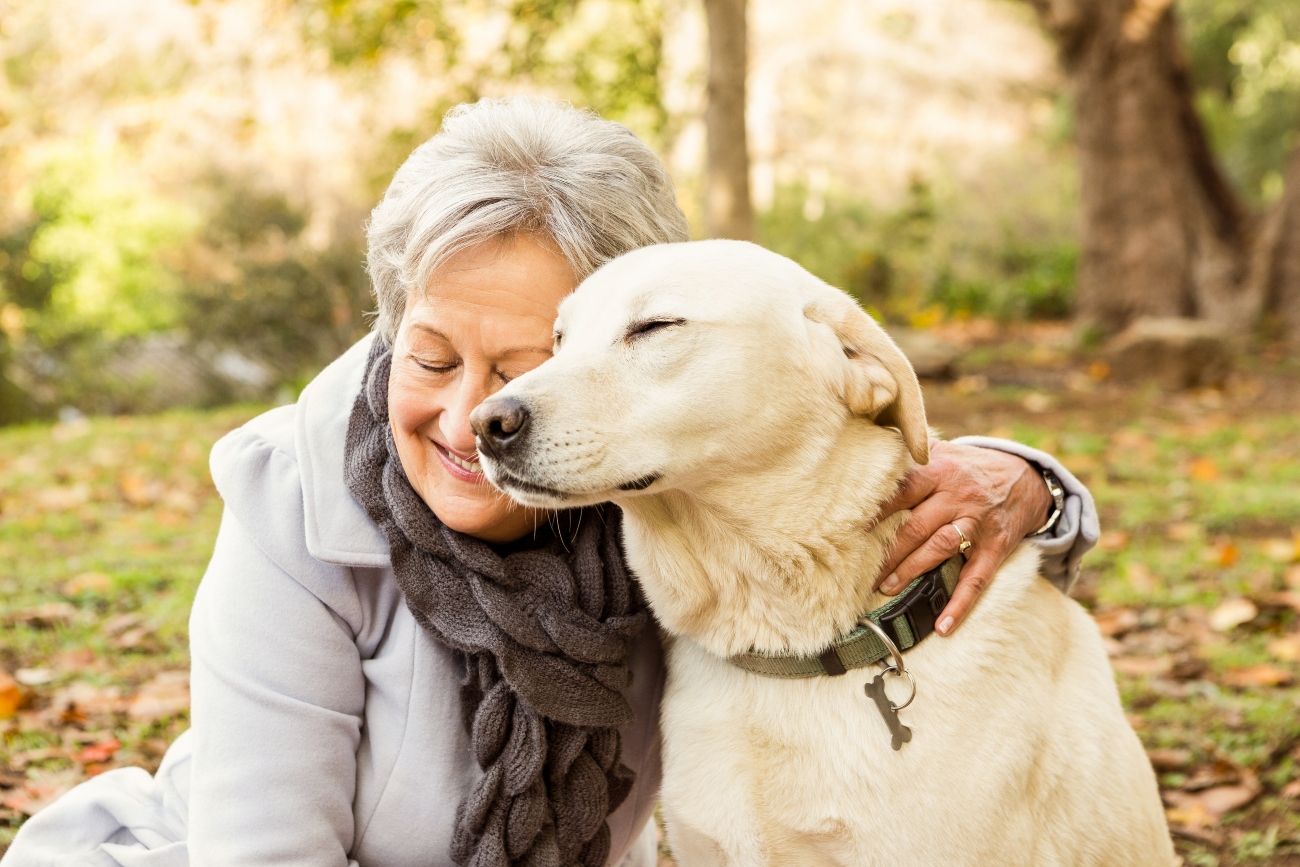
Pancreatitis in dogs
28th April, 2023
Pancreatitis in dogs can be painful and potentially life threatening. Get to know the signs and how to help your dog on the road to recovery.
Have you noticed your pooch looking a little poorly lately? Not eating properly, being sick and appearing generally weak could all be signs of pancreatitis, which can become severe if left untreated.
As worrying as this is to you as a loving pet parent, it’s reassuring to know your canine companion can fully recover when you take them to the vet in time.
Below, we look at what causes the condition and the warning signs to look out for. Learn what treatment to expect and how senior dog insurance in the UK can help pay for those unexpected vet bills throughout your pet’s golden years.
What is pancreatitis in dogs?
We’ve all heard of the pancreas, but what does it actually do? Time for a quick biology lesson!
The small organ produces hormones that control your pet’s blood sugar levels and enzymes that help break down food. If these enzymes activate too early (while they’re still in the pancreas), it irritates the organ, causing inflammation – or pancreatitis.
The health issue can be acute, happening just once, or chronic, occurring time and time again. Both types can be mild, severe or even life-threatening, so getting your ageing pooch to the vet as soon as you spot the signs is vital to a full recovery.
If your pet is showing symptoms but you aren’t sure if they relate to pancreatitis or not, don’t hesitate to use our 24-hour vet video service. Enjoy unlimited, around-the-clock consultations with senior dog insurance in the UK from Petwise.
Why do dogs get pancreatitis?
It’s often difficult to pinpoint the exact reason for your dog’s pancreatitis, but eating a lot of high-fat food in one sitting is a common cause.
That’s why it’s so important to keep fatty foods out of your pet’s reach and avoid giving them your table scraps, however much they keep staring you down with those puppy dog eyes!
You can find a whole list of what your senior pooch can and can’t eat elsewhere on our site.
Other factors that can trigger pancreatitis in dogs include:
- Diabetes
- Some cancers
- Hypothyroidism
- Being overweight
- Certain poisons
- An adverse reaction to medication
- Recent surgery
Keeping track of what your dog eats and whether they may have ingested poison can help your vet determine the cause if it isn’t one of the related health conditions.
Are some dogs at higher risk than others?
Like with many health issues in dogs, some breeds are more predisposed to pancreatitis than others. According to the Kennel Club, the most at risk are:
- Miniature schnauzer
- Cavalier King Charles Spaniel
- Boxer
- Cocker spaniel
- Border collie
- Terriers
- Other small breeds
Older dogs, especially those that are overweight or who’ve recently had surgery, are also at higher risk.
If you own one of these breeds and your pooch is getting on in years, don’t worry. It’s not inevitable that your faithful companion will develop pancreatitis. You can help lower the chances by getting regular check-ups with the vet to spot the condition early on and feeding them a healthy diet.
What are the signs of pancreatitis in dogs?
No owner wants to see their old dog suffering, so it’s important to know what to look for and get them treated before the condition becomes severe.
What are the warning signs of pancreatitis in dogs?
- Eating less than normal
- Dehydration
- Stomach pain (look for a hunched back, bloated tummy and lowered front legs and head). This may also be similar in cats with bloating too.
- Bloody diarrhoea
- Vomiting
- Weakness
- Fever. You can also read about this in cats too, elsewhere on our blog.
When left untreated, pancreatitis can be life threatening, so contact your vet as soon as you notice the signs. Treatment can cost a small fortune over time, so investing in senior dog insurance in the UK while your pooch is still healthy is essential to getting the emergency care they deserve.
When should you contact your vet?
Call your vet at the first sign of any symptoms mentioned above or if you think they might have pancreatitis, especially if they’ve had it in the past.
You know your canine companion better than anyone, so even if they don’t display any tell-tale signs, it’s still a good idea to get them checked out.
If left untreated, pancreatitis can cause a lot of suffering to your poor pooch and even sudden death.
How do vets treat dogs with pancreatitis?
Your vet diagnosed your elderly pooch with pancreatitis, so the road to recovery can begin, but the course of treatment will depend on how far the condition has progressed.
Treating mild to moderate pancreatitis in dogs
If you catch your dog’s condition in the early stages, they might need to spend a day or two at the vets with an IV to help them rehydrate. You can also expect your poorly pet to get:
- A stomach protectant
- Pain relief
- Antinausea medicine
You’ll need to step up as their pet parent, too, and encourage them to eat small, low-fat meals – your vet should recommend a specific diet to follow. Check if your senior dog insurance in the UK offers contributions towards special diets.
Mild to moderate cases should ease within a week or two, but you might need to consider a permanent dietary change, especially if your canine companion belongs to one of the high-risk groups mentioned above.
Treating severe pancreatitis in dogs
Older dogs with severe pancreatitis usually need more extensive treatment, which can last for weeks and include:
- Pain control
- Antinausea medication
- A stomach protectant
- Intensive IV and electrolyte intervention for dehydration
- Antibiotics
- A feeding tube
Once your sickly pooch is allowed to return home, you’ll need to keep them on a low-fat diet and monitor their condition closely. Make sure your golden oldie is comfortable and well looked after to aid a full recovery and get them back to living their best life.
How long is the recovery period from pancreatitis?
For milder cases, you can expect your dog to get back to normal in a week or so, but when the pancreatitis is more severe, it can take months. In dogs suffering from chronic pancreatitis, it can return various times throughout their lifetime and never properly go away.
Helping your dog stay healthy after pancreatitis
If your beloved dog has ever had pancreatitis, whether it was acute or chronic, they may be at risk of developing it again. There are a few ways you can help lower the risk and provide ongoing care to your four-legged family member.
Watch what they eat
Yes, we’ve already mentioned your senior dog’s diet a few times, but it’s so important to monitor their food intake. Dog food sold in most shops contain a lot of fat – more than what your elderly pooch needs.
Speak to your vet to find the right diet for your dog, which could mean prescription food in some cases.
You also need to steer clear of fatty treats, so switch fatty strips of meat for chicken breast and that creamy cheese for a crunchy carrot. You might be surprised how much your dog enjoys a bit of veg!
Keep them active
As your once young and sprightly dog becomes older, it’s normal for them to slow down a little, but that doesn’t mean you should be taking them out any less.
Staying within their ideal weight range and keeping fit is key to living their life to the fullest. Make sure you stick to a regular exercise routine (we’ve got tips for walking your older dog, too) and give them plenty of chances to use up energy indoors with toys and games.
Being overweight is one of the main triggers of pancreatitis, so keeping an eye on your furry friend’s waistline is important. You can tell your pet needs to trim down when:
- You can’t see or feel its spine, ribs and waistline.
- They have a larger, rounder face.
- They‘re reluctant to go on a walk or lag behind you.
- They pant excessively on walks.
- They need help to get in and out of the car.
Protect them with pet insurance
One of the best ways you can look out for your older dog’s health is with pet insurance. Make sure you take out a policy while your pooch is still healthy, though, or you might struggle to find them protection.
Senior dog insurance in the UK pays for the treatment costs in an emergency, like pancreatitis, so you can get them the care they deserve. You can also access our 24/7 vet video service through FirstVet with your Petwise policy to get quick advice whenever you need it.
Consider a pet health plan
While senior dog insurance in the UK can help you in an emergency, it doesn’t pay for routine treatment like:
- Vaccinations
- Neutering and spaying
- Flea and worming treatments
- Routine check-ups (see why these are so important)
- Grooming
When your dog becomes a part of your family, you’ll need to budget for these expenses to keep them healthy. If you're struggling to pay for it all, you can speak to your vet about a pet health plan to help spread the costs throughout the year.
Do dogs survive pancreatitis?
Many dogs who have pancreatitis will make a full recovery when they get the right care in time. When the condition reaches a more serious stage, it can be more difficult to treat, and the outcome isn’t as predictable.
This prognosis highlights the importance of seeking your vet’s advice as soon as you notice the signs. The longer you wait, the less chance your dog has of recovering and the more it will cost if you don’t have senior dog insurance in the UK.
What’s the life expectancy of a dog with pancreatitis?
Just like the recovery period, life expectancy varies greatly depending on the severity of the condition. In mild cases, many dogs go on to live a long and happy life, whereas those with severe pancreatitis may suffer from symptoms many times over, which could see their life expectancy shortened.
Can my dog eat normally after having pancreatitis?

In most cases, your vet will recommend you stick to a low-fat diet to lower the risk of your dog developing the condition again. Avoid giving them fatty treats, like cheese and fatty meat, and keep them out of your dog’s reach.
Work together with your vet to find a diet that’s suitable and sustainable for you and your dog. Some policies for senior dog insurance in the UK can include contributions for special diets.
What other health conditions are common in older dogs?
With age comes the increased risk of various health issues for your pet. Of course, no pet parent wants to see their loyal companion suffer, so it’s a good idea to learn about the various conditions your senior might have to be able to spot them early on.
Just like with pancreatitis, when your vet diagnoses a condition in the early stages, the outcome is much brighter for your dog.
So, what medical concerns do you need to know about as a senior dog owner?
Arthritis
Dogs can develop this condition just like humans, affecting their movement and causing lots of pain and stiffness. The most common type in canines is osteoarthritis, which gradually gets worse over time.
Signs your four-legged friend is suffering include:
- Limping and lameness
- Getting up or lying down cautiously
- Flinching when you touch joints
- Tiredness
- Irritability
- Muscle wasting
- Constant licking of painful areas
The Blue Cross says that dogs can lead a good quality of life when they have pain management and are well-looked after (that’s where you come in). Take it easy when you see they’re having a particularly stiff day and keep walks regular but short with plenty of breaks.
Hearing loss
Another progressive concern for senior pets is deafness. Dogs lose hearing as cells and nerves degenerate, and they adapt very well when it happens slowly over time. It can be hard to tell they’re going deaf to begin with, but look for:
- Not responding to their name
- A change in obedience
- Ignoring verbal commands
- Becoming less active
- Barking more than usual
Deafness in old dogs is usually easy to manage, but you might want to start implementing hand signals rather than audio cues for common commands to make the transition easier on you both.
Kidney disease
Ageing in any animal can take its toll on the kidneys, slowly developing to kidney disease and eventually failure. Unfortunately, there’s no cure for your older dog, but there are ways to treat it and improve their quality of life.
To catch the disease early on, look for:
- Drinking and urinating more than normal
- Accidents in the house
- Loss of appetite
- Vomiting
- Diarrhoea
- Rapid weight loss
- Pale gums (due to anaemia)
Once you get your dog to the vet, they’ll check their urine and blood for the disease and prescribe medication and possibly a special diet.
Cognitive dysfunction
You’ve heard of Alzheimer’s and dementia. Well, canines can experience similar cognitive decline, sometimes called doggy dementia.
Signs might be subtle at first, but soon get worse, making it difficult for your loyal companion to navigate the world. Watch your pet for:
- Disorientation and confusion
- A change in behaviour/personality
- Anxiety and depression
- Changes in sleeping patterns
- Appearing withdrawn
- Having accidents in the home
These symptoms can also point to other conditions, so make sure you see your vet for a proper diagnosis. Sadly, there’s no cure for doggy dementia but medications and supplements might provide support along with your love and care to help your dog feel comfortable.
Blindness
Just like with its hearing, your canine companion can also experience vision loss with age. Degenerative changes are usually the cause, but it’s sometimes due to diseases like cataracts. There are a few hints that your dog is going blind:
- Cloudy looking eyes
- Bumping into objects
- Anxiousness in new surroundings
- Less willing to jump onto furniture/go up and down stairs
- Staring into space
- Red, puffy or swollen eyes
There’s not a lot a vet can do to help your dog regain their vision, but luckily canines have lots of other super senses that mean they can still live a relatively normal life. If blindness is sudden, it’s a medical emergency and you’ll need to get your pet seen immediately.
Dental disease
Regular tooth brushing throughout your dog’s life is essential to lowering the risk of dental disease. Not sure how? Find out in our article on taking care of your dog’s oral hygiene.
Of course, you might forget now and again, but daily brushing along with chews and toys that help clean your senior’s teeth makes a huge difference to their oral health.
Signs that your pooch is suffering from dental disease include:
- Yellow or brown teeth
- Inflamed and bleeding gums
- Loose teeth
- Bad breath
- Weight loss
- Low appetite
- Bloody saliva
At Petwise, we understand that your old hound’s teeth aren’t what they used to be, despite your constant care. Protect your pooch with senior dog insurance in the UK from us and get dental cover as *.
Obesity
Old dogs get slower and find it harder to walk off their meals, but that doesn’t mean it’s OK to let them tip the scales.
Obese dogs are far more likely to suffer from further health concerns, like:
- Diabetes
- Heart disease
- Arthritis
- Cancer
Make sure your dog gets out for a walk or two every day, even if it’s a very slow one, and weigh out their meals to avoid giving them too much food. The fitter your dog, the better quality of life they’ll enjoy during their golden years.
Cancer
Sadly, this disease is relatively common in canines, especially as they get older. Different types of cancers cause varying symptoms, which pet parents sometimes dismiss as a regular part of ageing.
That’s why it’s so important to take your beloved dog for regular check-ups at the vet. Ask for a wellness screening to spot something that can’t be seen with the naked eye and catch the disease early on. The sooner your vet diagnoses the cancer, the better chance your pet has of survival.
Protect your old dog with Petwise

At Petwise, we believe older dogs deserve protection just as much as playful pups.
Our specialist senior dog insurance in the UK comes with dental cover as standard and round-the-clock vet video consultations to get quick, professional advice.
There’s no upper age limit for the oldest dogs on the block.
*Terms and conditions apply, subject to annual health checks. However, pre-existing conditions will not be covered.